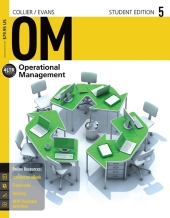 Neuerscheinungen 2015Stand: 2020-02-01 |
Schnellsuche
ISBN/Stichwort/Autor
|
Herderstraße 10
10625 Berlin
Tel.: 030 315 714 16
Fax 030 315 714 14
info@buchspektrum.de |

David Collier, James Evans
(Beteiligte)
OM 5 (with CourseMate, 1 term (6 months) Printed Access Card)
With online resource
5th ed. 2015. 432 p. 276 mm
Verlag/Jahr: CENGAGE LEARNING EMEA; SOUTH WESTERN COLLEGE 2015
ISBN: 1-285-45137-6 (1285451376)
Neue ISBN: 978-1-285-45137-4 (9781285451374)
Preis und Lieferzeit: Bitte klicken
Created through a "student-tested, faculty-approved" review process with more than 150 students and instructors, this concise, engaging introduction to operations management offers a full suite of proven learning tools for today´s learners.
1. Goods, Services, and Operations Management.
Operations Management. OM in the Workplace. Understanding Goods and Services. Customer Benefit Packages. Processes. OM: A History of Change and Challenge. Current Challenges in OM.
2. Value Chains.
The Concept of Value. Value Chain Paradigms and Perspectives. Value Chain Decisions. Offshoring. Value Chains in a Global Business Environment. Sustainable Value Chains.
3. Measuring Performance in Operations.
Types of Performance Measures. Analytics in Operations Management. Designing Measurement Systems in Operations. Models of Organizational Performance.
4. Operations Strategy.
Gaining Competitive Advantage. Understanding Customer Wants and Needs. Evaluating Goods and Services. Competitive Priorities. OM and Strategic Planning. A Framework for Operations Strategy.
5. Technology and Operations Management.
Understanding Technology in Operations. Technology in Value Chains. Benefits and Challenges of Technology. Technology Decisions and Implementation.
6. Goods and Service Design.
Designing Goods and Services. Customer-Focused Design. Designing Manufactured Goods. Service-Delivery System Design. Service-Encounter Design.
7. Process, Selection, Design, and Analysis.
Process Choice Decisions. The Product-Process Matrix. The Service-Positioning Matrix. Process Design. Process Analysis and Improvement. Process Design and Resource Utilization.
8. Facility and Work Design.
Facility Layout. Designing Product Layouts. Designing Process Layouts. Workplace Design.
9. Supply Chain Design.
Understanding Supply Chains. Designing the Supply Chain. Sustainable Supply Chains. Measuring Supply Chain Performance. Location Decision in Value Chains. Other Issues in Supply Chain Management.
10. Capacity Management.
Understanding Capacity. Capacity Measurement in Operations. Long-term Capacity Strategies. Short-term Capacity Management. Theory of Constraints.
11. Forecasting and Demand Planning.
Forecasting and Demand Planning. Basic Concepts in Forecasting. Statistical Forecasting Models. Regression as a Forecasting Approach. Judgmental Forecasting. Forecasting in Practice.
12. Managing Inventories.Understanding Inventory. Inventory Characteristics. ABC Inventory Analysis. Managing Fixed-Quality Inventory Systems. Managing Fixed-Period Inventory Systems. Single-Period Inventory Model.
13. Resource Management.
Resource Planning Framework for Goods and Services. Aggregate Planning Options. Strategies for Aggregate Planning. Disaggregation in Manufacturing. Capacity Requirements Planning.
14. Operations Scheduling and Sequencing.
Understanding Scheduling and Sequencing. Scheduling Applications and Approaches. Sequencing. Applications of Sequencing Rules. Schedule Monitoring and Control.
15. Quality Management.
Understanding Quality. Influential Leaders in Modern Quality Management. The GAP Model. ISO 9000:2000. Six Sigma. Cost-of-Quality Measurement. The Seven QC Tools." Other Improvement Strategies.
16. Quality Control and SPC.
Quality Control Systems. Statistical Process Control and Variation. Constructing Control Charts. Practical Issues in SPC Implementation. Process Capability.
17. Lean Operating Systems.
Principles of Lean Operating Systems. Lean Tools and Approaches. Lean Six Sigma. Lean Manufacturing and Service Tours. Just-in-time Systems.
18. Project Management.
The Scope of Project Management. Techniques for Planning, Scheduling and Controlling Projects. Time/Cost Trade-Offs. Uncertainty in Project Management."


